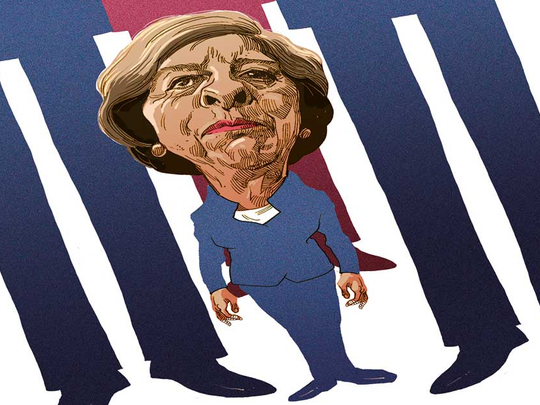
A ‘global’ Britain. That was the plan. A Britain that would leave the European Union (EU) and pivot confidently towards the rest of the world. Unfettered by the bureaucrats in Brussels, Britain would reap the benefit of lucrative trade with foreign companies and open its arms to overseas citizens whom it could not hitherto embrace.
Non-EU citizens resident in the United Kingdom were told that things would get easier for them when the country could take control of EU immigration, and during the referendum campaign, Priti Patel, Secretary of State for International Development, had launched a “Save our curry houses” appeal. Leave specifically stated that the country’s immigration policy was hamstrung by its EU membership, and thus a vote for Brexit was a vote for fewer restrictions on allowing more immigration from outside Europe.
This vision is now in tatters. Prime Minister Theresa May, instead of extending more rights of movement and settlement to curry house chefs and other skilled migrants, intends to charge companies £2,000 (Dh9,393) a year for every skilled non-EU migrant they employ in an effort to slash immigration to tens of thousands a year. This broken promise reveals Leave’s pledges to be desperate at manipulations, playing off one set of migrants against another. It also exposes how the Conservative party is doubling down on the potential loss of skilled labour from the EU by cracking down on skilled labour from outside the EU — all while claiming that these moves enhance the prosperity and marketability of the country. The party’s position on overseas students and skilled workers is an exercise in doublethink.
The Tory manifesto states that: “The nature of the immigration we have — more skilled workers and university students, less abuse and fewer unskilled migrants — better suits the national interest.” That makes sense. Skilled workers and university students who will fund the country’s world-class academic institutions sound like a good place to start to plug the shortfall resulting from curbing free movement. But in the same breath it says: “We will increase the earnings thresholds for people wishing to sponsor migrants for family visas. We will toughen the visa requirements for students, to make sure that we maintain high standards.”
How does that work?
Technically, in real life, how does that work? How does one attract more students and skilled workers by making it harder for them to come to the country and bring their families? It is an unrealistic, entitled position at best, a dishonest one at worst. What is most alarming is the afterthought text on how immigration from the EU would be limited — the grievance that Brexiters were supposed to be upset about in the first place. The “plan” is addressed in two sentences telling us that, at some point, there will be a plan. This isn’t even a fag-packet scribble. The breezy declaration of intent is stunning in its sloppiness and lack of preparation.
Similarly, since global commerce is Plan A, and Plan B is that there is no Plan B, there is no indication of the size of this global pool of trade. Just a ballpark figure would do at this stage to provide reassurance, given that the country is leaving an economic union that received 44 per cent of its exports in 2016. But not even that has been determined.
The lack of detail and contradictory posturing is down to the fact that the government is trying to pander to anti-immigration sentiment, knowing that it was this that animated many to support Brexit, without the nuance that distinguishes between EU and non-EU immigrants. In doing so, it sets out policies that severely compromise its ability to trade with non-EU partners by limiting their ability to visit the UK or work in the country. At the heart of this lies the hubristic idea that Britain can just go back to doing things as it did before — dictating the terms of commerce while keeping its business partners at arm’s length. You know, like when they were colonies. If you think this is a reach, take a look at some of the language in the manifesto: “We believe Britain should play an active, leading role in the world. Not because it is our right or inheritance, but because our leadership in the world is the surest way to defend and advance the interests of the British people, and to extend around the world those values that we believe to be right.”
This is not a nation that is reaching out to equals, but to economies that it can plunder to offset the costs of its political adventurism. And apparently, one way it can achieve that is by charging them a tithe for paying taxes in the country and contributing to the National Health Service. How is this an incentive? Global Britain is simply a lie. The government, animated by populist anti-immigration sentiment and blinded by the approaching Brexit headlights, is putting its electoral interests before the interests of the British people, those very interests that it claims to “defend and advance”.
— Guardian News & Media Ltd
Nesrine Malik is a Sudanese writer and commentator who lives in London.









